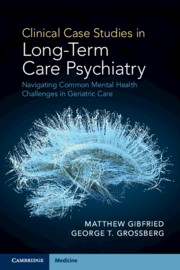 Clinical Case Studies in Long-Term Care Psychiatry
Clinical Case Studies in Long-Term Care Psychiatry Treatment of Depression and Anxiety at End of Life
Published online by Cambridge University Press: 31 October 2024
The primary care provider is often the first clinician to recognize the high burden of life-prolonging treatment for a resident who has limited life expectancy and high medical and neurocognitive comorbidity. Palliative care refers to specialized medical care provided to individuals with serious illnesses or conditions that are not curable. The goal of palliative care is to improve the quality of life for patients by alleviating symptoms, managing pain, and addressing the physical, emotional, social, and spiritual needs associated with their condition. Clinical depression is relatively common at the end of life. The prevalence of major depressive disorder at the end of life for cancer patients is estimated to be between 5-20%. Choose psychotropic medications that have a quicker response time when possible. Examples include stimulants for depressive symptoms and benzodiazepines for anxiety. SSRI’s, SNRI’s, and other more commonly prescribed medications for depression and anxiety may take up to four to six weeks for clinical response.
To save this book to your Kindle, first ensure [email protected] is added to your Approved Personal Document E-mail List under your Personal Document Settings on the Manage Your Content and Devices page of your Amazon account. Then enter the ‘name’ part of your Kindle email address below. Find out more about saving to your Kindle.
Note you can select to save to either the @free.kindle.com or @kindle.com variations. ‘@free.kindle.com’ emails are free but can only be saved to your device when it is connected to wi-fi. ‘@kindle.com’ emails can be delivered even when you are not connected to wi-fi, but note that service fees apply.
Find out more about the Kindle Personal Document Service.
To save content items to your account, please confirm that you agree to abide by our usage policies. If this is the first time you use this feature, you will be asked to authorise Cambridge Core to connect with your account. Find out more about saving content to Dropbox.
To save content items to your account, please confirm that you agree to abide by our usage policies. If this is the first time you use this feature, you will be asked to authorise Cambridge Core to connect with your account. Find out more about saving content to Google Drive.